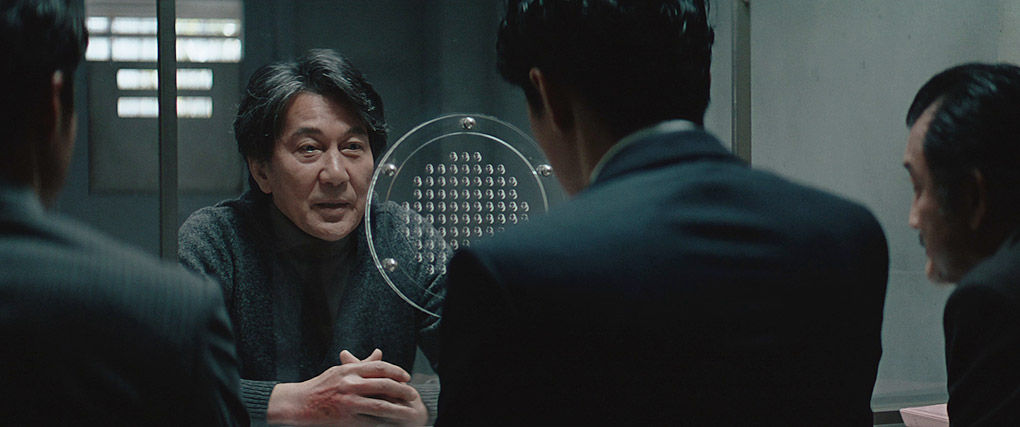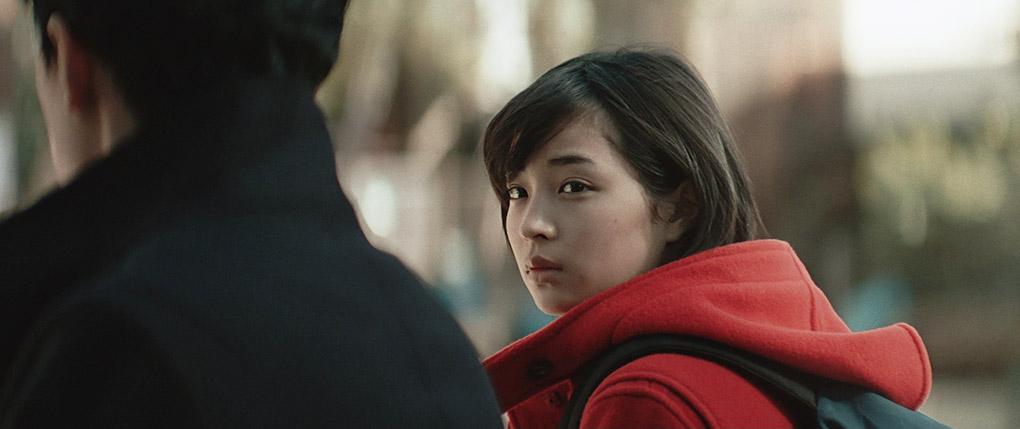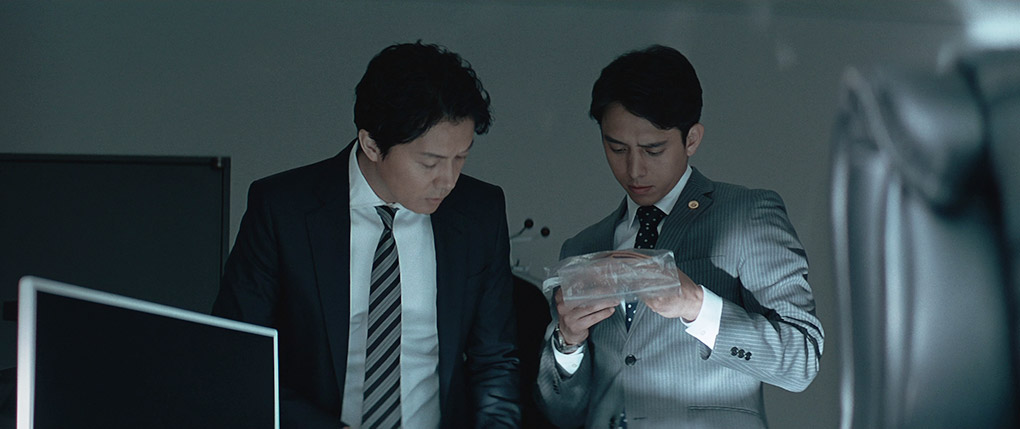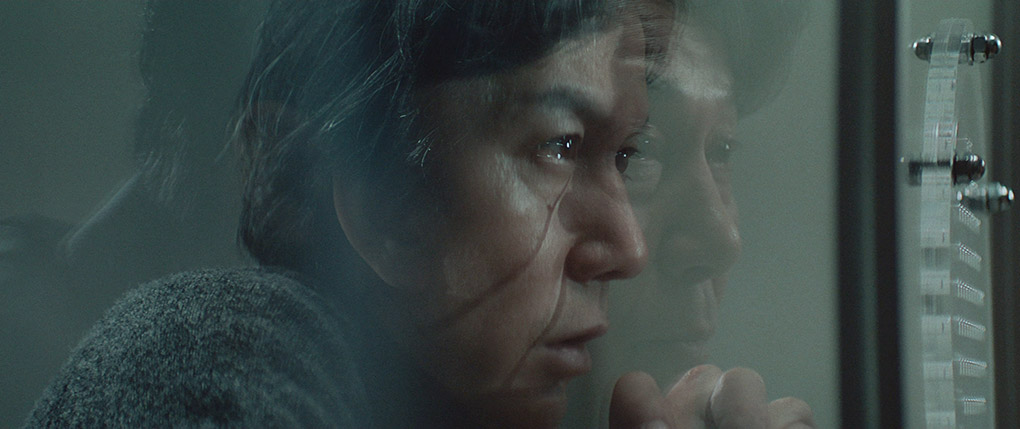|
A good courtroom drama will often hang on the uncertainty over whether the accused is actually innocent or guilty, or on whether the council for the defence can prove the innocence of the wrongly accused against difficult odds. Kore-eda Hirokazu's The Third Murder [Sandome no satsujin] takes a slightly different approach. In the opening shot, repeat offender Misumi (Yakusho Kôji) is shown brutally hitting the owner of a factory from which he was recently fired over the head with a metal wrench and then pouring petrol over his body and setting it on fire. When arrested, Misumi confesses to having killed and robbed his victim, and as this is not his first murder conviction, it appears to be a foregone conclusion that he will get the death penalty for his crime. When prominent lawyer Shigemori (Fukuyama Masaharu) is brought in to handle the case, Misumi is open about his guilt and offers nothing in the way of extenuating circumstances. An open and shut case, then. Roll credits. Yet at this point we're less than seven minutes into a two-hour-plus film. Where could it possibly go from here?
This is the first hook in a film that has several. The next comes when Shigemori, who has been tasked with the job of poking a couple of meaningful holes in the prosecution's case to get the probable death sentence reduced to life imprisonment, begins having doubts about the supposed facts of the case. As he examines the evidence in detail and begins looking into Misumi's background, he finds himself questioning the accused man's true motivation for the killing, but the seemingly ever-upbeat Misumi seems playfully unwilling to confirm or deny his lawyer's findings. Then out of the blue, a magazine interview with Shigemori is published that turns this aspect of the case on its head.

I'm reluctant to reveal any further details of how the case unfolds because one of the real pleasures of The Third Murder comes from wondering just where the unfolding blend of truth and untruth will take the story next. And to underline this point, I have to make the sort of confession that most film fans tend to keep to themselves for fear of provoking the ire of loudly vocal purists, but since when have I ever cared about that? Due to other commitments and an increasingly preposterous daytime workload, I was initially convinced that I wouldn't be covering Arrow's disc release of The Third Murder – the fact that I was sent a DVD review disc instead of a Blu-ray may just have had a small degree of influence here. But a couple of nights ago I'd completed and posted another review, and as it was just gone 10pm and the film has a two-hour running time, I decided to watch it with the intention of writing a review of the film while I waited for the freshly ordered Blu-ray edition to arrive. Now if you live in the UK, it probably won't have escaped you that we're currently experiencing the hottest and driest summer in decades. I work in a small office with poor ventilation and a window that gets hit by the sun all afternoon. It's absolutely stifling, and by the time I get home, all I'm ready to do is throw off my work clothes and flop into a chair. This was the hottest evening yet, and 40 minutes into the film I realised I was suddenly in the grip of heat-induced fatigue, and thus criminally had to quit watching the film and fall onto my bed and melt into sleep. My productivity the following day was far from its peak, partly due to the heat, but primarily because I couldn't get what I'd seen of The Third Murder out of my head. I thus spent the whole damned day just itching to get home and fire up the DVD to see what happened next.
This ability to grip so strongly is no mean feat when you consider that the film is structured almost exclusively as a series of conversations between Shigemori and his fellow defence team members, his client, potential witnesses and other legal professionals. For the first half this resembles a police procedural, as Shigemori starts to question aspects of the prosecution's case and even Misumi's story, reviewing video footage and chasing potential sources of information in an effort to make sense of elements that, for him at least, just don't quite add up. Part of the interest here lies in the small but sometimes quietly significant ways that the Japanese legal system differs from our own, whist also delivering the traditional pleasures that come from watching someone uncover crucial information through dogged detective work.

All of which makes The Third Murder sound like an atypical work from Kore-eda, whose principal focus has been disharmony and breakdown of communication and relations within the modern Japanese family unit. But as The Third Murder unfolds, it becomes clear that this is also a key component of the film, as the difficulties the separated Shigemori is having with his teenage daughter are revealed over time to be reflected in the even more problematic – and potentially case-relevant – father-daughter relationships of both Misumi and his victim. Shigemori also has to seek advice on the case from his father, a retired legal professional who – in a slightly contrived plot twist – was the judge in Misumi's first murder trial and who then winds up his son by turning up at his office and cheerily announcing that he plans to stay in town for a few days.
But Kore-eda is also clearly interested in the sometimes subjective nature of truth and the idea that we should never accept at face value information that, however seemingly factual, could be manipulated by others into appearing to be something other than it actually is. If even a seemingly open-and-shut case such as this could turn out to be far more complex than it appears, then what of instances where decisions about a person's guilt are innocence are judged on a single contentious piece or evidence or a sole witness testimony? The film also suggests that deception is not in itself an inherently negative act and that people may lie to others for a variety of not always dishonourable reasons and that the search for truth, however determined and well-intentioned, may never result is anything close to concrete certainty.
As ever, Kore-eda directs with an almost invisible hand, his only purposeful flourish coming in a late-film scene in which Shigemori interviews Misumi through the glass screen that unites them by positioning his reflected face almost atop that of his client, which seems to invite us to read subtextual meaning into the visuals as well as the scene's teasingly inconclusive dialogue. It's a neatly low-key conclusion to a fascinating legal drama in which the court case around which the story theoretically revolves occupies a surprisingly small amount of screen time, and is further proof that you don't need to cram a film with action and incident to tell a compelling and thoughtful screen story.

Before I sign off, I do feel the need to pass quick comment on the film's title, or more specifically how it seems to have been interpreted by others. On this very disc, the venerable Tony Rayns suggests that the third murder of the title refers to the potential execution of Misumi, an interpretation I've seen echoed in a couple of reviews. They may well be right, and the subtextual implications of this are certainly food for thought within the context of how the drama plays out. Yet I can't be the only one who noted that Misumi's first conviction was for the murder of two loan sharks, which unless my maths skills have suddenly deserted me would make his killing of the factory owner his third murder of the title.
The Third Murder was Kore-eda's first digital feature and was shot on Arri Alexa XT Plus in the 2.35:1 aspect ratio, and the 1080p HD image on Arrow's Blu-ray is as pristine as a well-coded transfer should be from such a digital master. Detail is sharp, the contrast is very well balanced, and although the colour palette has a muted feel, this appears to have been achieved primarily through the costume and production design, as flesh tones seem fine and the colour is otherwise naturalistic.
Both a DTS-HD Master Audio 5.1 surround and a Linear PCM 2.0 stereo track are on offer, and in a film devoid of dynamic physical drama and constructed largely around conversations, there's not a lot to choose between them. The music score has a slightly wider spread on the DTS-HD track and the dialogue is centred instead of being spread across the two main front speakers as it is on the stereo track, but sonically both are of excellent quality.
Clearly displayed optional English subtitles are activated by default.
Tony Rayns on The Third Murder (38:01)
Asian cinema expert Tony Rayns kicks off this typically enthralling assessment of the film with a useful breakdown of the Japanese legal system, its history and how it differs from our own, which should help clarify this element of the film for those not well versed in this aspect of Japanese society (and you can count me among them). He highlights the scarcity of Japanese courtroom dramas and analyses the film's plot and its subtextual concerns, as well as providing details on the actors, writer-director Kore-eda and Italian score composer Ludovico Einaudi. It's also here that I first encountered the proposal that the possible execution of Misumi was the third murder of the title, and hey, maybe it is, but I've already said my piece on this, and backup for my viewpoint is included below.

The Making of The Third Murder (30:01)
Narrated by actor Ichikawa Mikako in the same deadpan legal voice she employs in her role in the film as androgynous prosecution lawyer Itsuki Sasabara, this tidily shot featurette provides a welcome and revealing look behind the scenes during the making of the film. The planning is of particular interest here, involving as it does multiple script rewrites (plus another during the shoot itself) and Kore-eda's decision to have real-world lawyers roleplay the interviews and court proceedings in order to shape them into something more authentically true-to-life. Actors talk glowingly about working with Kore-eda, who has an almost whispered approach to directing talent, and we do get brief glimpses of him shooting of a number of key scenes.
Introductions by Cast Members (1:53)
Brief and polite introductions to the film from actors Fukuyama Masaharu (Shigemori), Yakusho Kôji (Misumi) and Hiroze Suzu (Sakie).
Behind the Scenes Image Gallery (10:10)
62 behind-the-scenes photos that can be advanced manually or allowed to play out as an automated slideshow.
Trailers and TV Spots
Included here are the UK Theatrical Trailer (1:32), which is well assembled but peppered with spoilers; the Japanese Theatrical Trailer (1:33), which is almost identical except for the language Japanese captions and alternative music; a Japanese Teaser (0:33), which grabs your interest without dropping any real spoilers; a too-quick-to-spoil-anything Japanese TV Spot 1 (0:18) and Japanese TV Spot 2 (0:18), which is the same as its predecessor but with a more excited narrator.
Booklet
The bulk of this booklet is an interesting essay of the film by Alexander Jacoby, who scores points from me for noting that the killing of the company president is indeed the third murder of the title. Also included is a short but still very worthwhile interview with Kore-eda, plus credits for the film and a number of promotional stills.
As a long-standing fan of the cinema of Kore-eda Hirokazu, I was intrigued by what on the surface appeared to be new territory for this filmmaker but nestled beneath the legal drama are a number of his favourite concerns, which are as intriguingly handled as ever. A fascinating film receives a top-notch transfer, and the extra features, though limited in number, are all worthwhile. Warmly recommended.
|